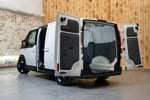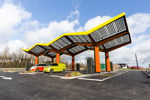Travelodge Hotels, which owns the Little Chef, says it wants to concentrate on the hotel side of its business, so is putting 120 of the outlets on the market.
It could be the end of an era for one of the UK’s best known roadside cafe chains if the new buyer wants to change the familiar name.
Almost a third of Little Chef customers are company car drivers and the firm has conducted research on customers driving for business and how they use the Little Chef.
It found that 70% are stopping for a comfort break, 54% to eat, 53% to have a break from driving and 34% for takeaway food.
With more than half of fleet drivers stopping for a driving break at some time, the move to sell 120 Little Chefs as a ‘going concern’ (a further 115 linked to Travelodges are being kept on), will mean fleets may have to find a new ‘local’ on the road.
The Travelodge Hotels group has been keen to forge alliances with the fleet industry in recent years. As a result, Little Chef has regularly supported campaigns against driver fatigue.
A Little Chef spokesman said: ‘We have helped to promote the Department for Transport’s THINK! road safety campaign to reduce the amount of sleep-related accidents occurring on our roads each year.’
So while a national shortage of Olympic Breakfasts, scampi and chips and those little lollies they give to kids could hit soon, there’s actually a more serious side to the closure of Little Chef. It is indicative of a trend, as has been seen in all areas of retailing, towards consolidation at super sites, where multinationals create huge sheds with everything under one roof.
They’re very convenient once you are there, but often require a longer trip to get there as there are less of them, and if this happens at our roadside, it means longer stints between stops.
Driver fatigue is thought to cause 20% of all road accidents and drivers failing to stop for regular rest breaks can be a contributing factor.
If the number of roadside service providers continues to dwindle, this could add to the problem, says Kevin Delaney, head of traffic and road safety at the RAC Foundation for Motoring.
He said: ‘If the number of places available to stop reduces, it means drivers would have to travel for longer. If a driver gets to the next stop and it is full, it is likely they will get back into the car having only had a couple of minutes break.
‘The Foundation wants more rest areas in between service areas to enable drivers to stop and have a break.’
The number of rest areas available has not really changed during the past decade, but what has changed is the volume of traffic and the length of journeys.
This means that a journey which used to take 20 minutes can now take up to an hour. The Highways Agency says that motorway stations should be approximately 30 miles apart, but there are no set guidelines for smaller A-roads – the traditional habitat of the Little Chef.
Delaney said: ‘On the motorway network there are guidelines. Stations should be about 30 miles apart. ‘This was a good idea in the motorway heyday when 25 miles of driving took less time.
‘Now we could do with service stations closer as traffic is usually crawling.’
Little Chef‘s vital statistics
Huge opportunity for more roadside catering outlets
ALTHOUGH it can be difficult to establish new service stations, there is still scope within the market for more sites, according to a Little Chef spokesman.
He said: ‘There is huge opportunity as the roadside catering market is now valued at £573 million, a growth of £23 million since 1999.
There are an estimated 30.4 million cars on the road offering a wider consumer base to draw on.
‘There is also an increasing incidence of snacking between meals and a growing demand for healthier and lighter meal options while on the road.’
The future for roadside cafes is set to be dominated not only by a need for healthy alternatives but also for available technology for business users.
Delaney said: ‘In the future operators will go where they see the best commercial advantage.
‘Most motorway services recognise holiday trade but this is concentrated at certain times. But business users are regulars so are fairly high in their sights.
‘Some service areas would like to provide conference rooms but the Highways Agency says motorway services shouldn’t be a destination in their own right.’
This means that they are often opposed to service stations opening facilities which encourage people to travel directly there, rather than just pass through.
However, there could be an increase in the number of business facilities at service stations including internet and laptop connections.
A Little Chef spokesman said: ‘Anything which embraces the evolving technological age to provide improved hospitality should be endorsed by any service provider.
‘Little Chef currently has more than 140 sites across the UK with wireless internet access.’
Stop to snack or fall foul of the law
A THIRD of drivers are unaware it is illegal to eat, drink or read a map while at the wheel of their car, a new survey has revealed.
It also found that 65% of drivers admit to using a hand-held mobile phone to text or call while driving, despite this being banned more than a year ago.
Such research demonstrates the important role roadside cafes play in driver safety. Research from RAC Auto Windscreens shows that almost half of drivers admit to spending time looking at other people while driving and ‘rubbernecking’ at accidents.
Eating, drinking or map reading is an offence covered under the careless driving section of the 1988 Road Traffic Act.
Bill Duffy, managing director of RAC Auto Windscreens, said: ‘We wanted to show Britain’s driving laws are unclear and are not properly enforced.
‘Of the people surveyed who knew it was an offence to eat and drink at the wheel, they only knew because of random cases that have been highlighted in the media.
‘We urge the Government to speed up new proposals for the prosecution of drivers who commit this type of crime, particularly those who cause death or injury to a third party when they have not given the road their full attention.’
Company moves to quell speculation
FOLLOWING speculation from media sources on the future of the Little Chef, including rumours that McDonald’s was set to buy the remaining outlets, the group has issued a formal statement.
It says: ‘We wish to strongly reiterate the sentiments expressed in our November 2004 announcement to seek a new owner for the brand Little Chef.
‘Little Chef is a strong brand name in the restaurant sector, attracting over 20 million customers a year, and has a loyal customer base and a unique network of UK roadside restaurants.
‘We are seeking to identify a buyer who is better placed to maximise its growth potential in the longer term.
‘We remain committed to retaining the 115 Little Chef outlets which share sites with our hotels and to sell the rest of Little Chef as a going concern.
‘It is our intention to agree with the new owner that we will continue to operate the Little Chef brand on these sites.
‘There has been substantial interest in Little Chef from a variety of UK and international companies, however, the process is at too early a stage to comment further. What is clear is that there is a widely held belief in the value of the Little Chef brand.’
Strict rules on setting up service stations
THE Highways Agency and local authorities have strict rules on the number and location of service stations.
Applying to open a new station can be a laborious process. Delaney explained: ‘Service stations have to apply to the local authority for planning permission before opening.
‘They need approval from the Highways Commission and would also need to buy land but most local authorities are not usually keen.
‘On an ordinary road network there are no formal guidelines – it depends on the local authority.’ Many of the roadside cafes on smaller A-roads such as the Little Chef, are based on cafes which have been there for the past 50 years.
‘If these were to close and the consent lapsed, it could be difficult to re-open one in five years’ time, as planning permission rules have changed,’ Delaney said.
According to the Highways Agency there are a total of 68 service stations along the motorway infrastructure in England.
However, the agency does not hold information on the number of stations positioned on A-roads.
Why I won’t be crying
By Matt Prior, road test editor, 4Car.co.uk
SO Little Chef, the roadside restaurant chain, is up for sale and some of its cafes may even close as a result. This, apparently, is sad news.
Well, there will be no disappointment inside any Prior-piloted automobile that passes the empty husk of a former Little Chef restaurant. The impending absence of portly ‘Charlie’ chef icons by the side of under-used A-roads suits me.
Only twice in the past couple of years have I been a Little Chef customer. We both had the ‘half roast chicken dinner’, (the chicken may have been roasted, but not too soon before our consumption of it), and a ‘bottomless mug of coffee’ each. Top-ups are free, but in truth our mugs definitely had bottoms, and in them was the sludge of what appeared to be instant coffee that hadn’t been stirred properly. For two quid a pop, the least we could’ve expected was a bit of teaspoon action.
This feast of dubious quality cost us the princely sum of £20. I could name half a dozen pubs within 10 miles of my house that do better food, and better coffee, at two-thirds the price.
The second and, I then vowed, last time I visited a ‘Chef’, I had a pot of tea and a bacon roll, my mate a coffee and eggs on toast. That would’ve cost about £6 from one of the relatively pricey cafes near 4Car’s London office. Imagine my surprise, then, when I didn’t get a tenner’s change from a £20 note.
Yet the RAC Foundation, which usually champions the cause of the motorist, still reckons that, if the 48-year-old Little Chef chain does close, ‘it will be a loss to the road network’. I’m not sure why this would be.
From my (admittedly limited) experience, a typical Little Chef, far from being an asset to the road network, far from the lively American diner concept that it set out to be nearly 50 years ago, is a lonely, desolate place visited by those with little imagination, little time and even less choice.
The muted rumble of traffic outside pervades through double glazing to a dingy, solemn and sparsely populated interior, a couple of staff on hand: unusually polite and friendly, to a point where one feels almost apologetic for having troubled them, until you reach the till afterwards.
The Daily Mirror reported an insider as saying ‘the only people who visited Little Chef were the elderly, the young, and people who wanted to use the lavatories.’ In the end, it turns out there just aren’t enough people who need the toilet that badly.
















Login to comment
Comments
No comments have been made yet.